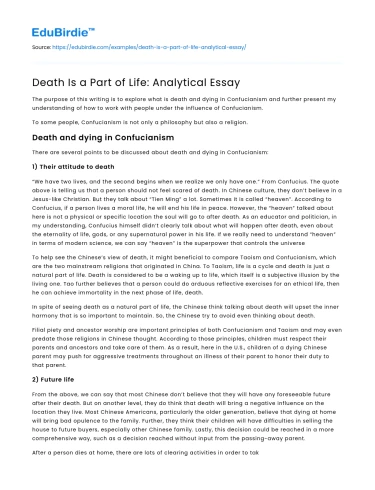Introduction
Death is often perceived as the antithesis of life, yet it stands as an intrinsic part of the existential cycle. The inevitability of death serves as a stark reminder of the finite nature of human existence. While death is commonly associated with fear and sorrow, its role in the broader tapestry of life is indispensable. Philosophers, theologians, and scientists alike have pondered the significance of death, each offering unique perspectives that contribute to our understanding of its place within the human experience. This essay seeks to explore the notion that death is not merely an end, but a crucial element that lends meaning to life. By examining cultural, philosophical, and biological dimensions, as well as engaging with opposing viewpoints, the essay will illustrate how death shapes and defines the living experience. Through this analysis, the essay will argue that the acceptance of death as a natural process can foster a more profound appreciation of life itself.
Philosophical and Cultural Dimensions
The philosophical inquiry into death has long been a central theme in human thought. Existentialists like Jean-Paul Sartre and Martin Heidegger have argued that the awareness of death is integral to understanding the essence of being. Sartre posited that the inevitability of death imbues life with urgency, compelling individuals to live authentically and make meaningful choices (Sartre, 1943). Similarly, Heidegger emphasized the concept of "being-toward-death," suggesting that a conscious acknowledgment of mortality can lead to a more authentic existence (Heidegger, 1927). These philosophical perspectives underscore the idea that death, rather than diminishing life, enhances its value by highlighting the importance of the present moment.
Save your time!
We can take care of your essay
- Proper editing and formatting
- Free revision, title page, and bibliography
- Flexible prices and money-back guarantee
Culturally, death is viewed through various lenses, often reflecting societal values and beliefs. For instance, in many Eastern traditions, such as Buddhism and Hinduism, death is seen as a natural transition in the cycle of rebirth. The Tibetan Book of the Dead, an ancient Buddhist text, presents death as an opportunity for spiritual liberation, encouraging a peaceful acceptance of the end (Thurman, 1994). In contrast, Western cultures often emphasize the finality of death, yet the growing acceptance of practices like eco-funerals and the celebration of life ceremonies indicate a shift towards viewing death as a continuation of the life cycle. These cultural interpretations highlight the diverse ways in which societies integrate death into the narrative of life, reflecting a universal quest to find meaning in mortality.
This exploration of philosophical and cultural dimensions illustrates how death is not merely an endpoint but a catalyst for living a purposeful life. However, the fear of death remains a significant counterpoint, often challenging the acceptance of mortality. Transitioning to the next section, we will further investigate how the biological aspects of death contribute to the continuity of life, addressing scientific perspectives that reinforce the interconnectedness between life and death.
Biological Perspectives and Continuity
Biologically, death is an essential component of the life cycle, facilitating regeneration and evolution. The process of decomposition, for example, is fundamental to ecological systems, wherein deceased organisms provide vital nutrients that sustain new life forms. This cyclical nature of life and death is epitomized in the concept of the "circle of life," where the end of one life supports the beginning of another (Capra, 1996).
On a cellular level, the phenomenon of apoptosis, or programmed cell death, plays a critical role in maintaining the health of multicellular organisms. Apoptosis eliminates damaged or unwanted cells, preventing the development of diseases such as cancer (Kerr et al., 1972). This biological process underscores the notion that death, even at the cellular level, is integral to sustaining life. The evolutionary perspective also supports the idea that death is necessary for the propagation of life. Natural selection, as proposed by Charles Darwin, operates on the principle that not all individuals survive to reproduce, thus ensuring the survival of the fittest and the adaptation of species over time (Darwin, 1859).
Despite these scientific insights, the fear of death and the desire for immortality persist in human consciousness. Advances in medical technology and the pursuit of anti-aging therapies reflect a societal reluctance to accept death's inevitability. However, these endeavors highlight the tension between the desire to prolong life and the natural processes that govern existence. As we transition to the conclusion, it becomes evident that embracing death as an integral part of life can lead to a more harmonious relationship with the natural world, fostering an appreciation for the transient beauty of life.
Conclusion
In conclusion, the examination of philosophical, cultural, and biological perspectives reveals that death is not merely an end, but a fundamental aspect of life that imparts meaning and continuity. Philosophical insights suggest that the awareness of mortality can enhance the quality of life, while cultural interpretations reflect a diverse array of beliefs that integrate death into the human narrative. Biologically, death is essential for the regeneration and evolution of life, reinforcing the interconnectedness of living systems.
While the fear of death and the quest for immortality present significant counterpoints, they also underscore the complexity of human attitudes towards mortality. By acknowledging death as a natural and necessary process, individuals can cultivate a deeper appreciation for life's ephemeral nature. Ultimately, death is not an adversary to be vanquished, but a companion in the journey of existence, reminding us of the value and urgency of each moment. Embracing this perspective can lead to a more meaningful and fulfilling life, where the inevitability of death serves not as a source of fear, but as an impetus for living with purpose and gratitude.






 Stuck on your essay?
Stuck on your essay?

